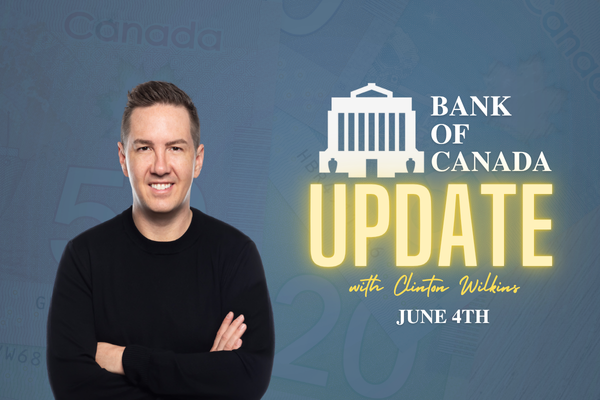Clinton Wilkins joins Todd Veinotte on 95.7 News Radio to discuss The Bank of Canada holding its key policy rate at 2.75%, marking the first pause after seven consecutive cuts.
Bank of Canada – Should I be in a fixed rate? | September 07, 2022
Clinton chats with CityNews host, Sam Laprade in Ottawa about the Bank of Canada announcement. The Bank of Canada increased the key overnight rate by 75 basis points, and prime rate will now be 5.45 per cent for many lenders. Clinton and Sam talk about if Canadians should be worried about the increase, what it means for the average home owner, if borrowers should be in a fixed rate, and what advice first time buyers should hear right now.
Bank of Canada Announcement – September 07, 2022: Should I be in a fixed rate?
Don’t feel like watching the video? Check out the transcript below.
Transcript:
Should we be worried?
Sam Laprade: [00:00:11.12] Well, many people holding their breath for the big announcement today from the Bank of Canada. Whenever we hear from the Bank of Canada, we hear from Clinton Wilkins. How are you, Clinton?
Clinton Wilkins: [00:00:20.49] I’m doing just great. Thanks for having me, Sam.
Sam Laprade: [00:00:23.07] Fantastic. Clinton Wilkins joins us from Clinton Wilkins Mortgage Team. I know this date is circled in your calendar and many homeowners are worried about today. Should we be worried, Clinton?
Clinton Wilkins: [00:00:36.60] Well, this is our second jumbo increase that we’ve had this year, Sam. As you know, in July, we had an increase of 100 basis points, which was quite a shocker for me. And I think the industry and the public, all were very surprised. We knew there was going to be another increase here in September, Sam, really due to what’s going on with inflation.
You know, there certainly have been some positive reports in the US and also in Canada that we’re starting to see inflation start to reduce a little bit. But the Bank of Canada is taking a very clear and direct message here by doing another increase and today they increased it by 75 basis points, which means the prime rate for most lenders will now be 5.45%.
What does this increase mean for the average home owner?
Sam Laprade: [00:01:20.01] And what will that mean, do you think Clinton, to you know, to the average homeowner.
Speaker3: [00:01:26.49] To the average homeowner, if you’re in a variable rate mortgage product or if you have a home equity line of credit that’s tied to the variable rate, if you’ve an adjustable payment, your payment is going to go up, Sam. Some payments will go up right away. Some will start going up in October.
The trigger rate
And if you’re in what we call like a traditional variable mortgage where the amortisation would get longer if the prime rate increases, some of those consumers are going to be close to what we call the trigger rate. So that’s something to be very cognisant of. If you have a variable rate mortgage that’s from one of the big five and the majority have a static payment, you may be in a situation where you’re going to be contacted by your lender to do a payment increase because you’re not making enough principal payment on your mortgage.
You know, we’ve enjoyed very low rates for quite some time, Sam, and I don’t think anyone’s surprised that we’re now in increasing rate environment. You know, there’s a lot of obviously things going on in the news. Many economists think that this may be our last increase, which I think is interesting.
Will this be the last increase for 2022?
Sam Laprade: [00:02:29.05] And do you think it will be?
Clinton Wilkins: [00:02:31.54] I think it’s a wait and see based on inflation. You know, we’ve had several increases now, Sam, and I believe now we should have enough to cool the, you know, the economy. The challenge is that the Bank of Canada wanted a soft landing. Probably that’s not going to happen now. We are going to be in recession type territory and, you know, the Bank of Canada probably has gotten this right 0% of the time. But with these rate increases it will start slowing the economy.
You know, anybody who is in a variable rate mortgage product, their payments are probably going up. And, you know, that really means they have less money to spend on consumer goods. The Bank of Canada has really made a clear message to Canadians, you know, we need to stop spending and we need to start saving our money. And I think we’re going to really have a bit of a storm now over the next 15 months.
Should I be in a fixed rate now?
But if we do become in a recession type situation and a lot of economists think that we’re going to be there by the end of 2023, we’ll start seeing some softening in the rates. And I think that brings up a really good point, because we’re certainly having a lot of conversations with consumers around potentially converting into a fixed rate.
Clinton Wilkins: [00:03:45.16] And I know obviously that’s a big piece of this conversation. And we think fixed rates are kind of at the peak. And, you know, the challenge is that if you do convert into a fixed rate, you’re going to be stuck with that rate, you know, for the next period of that term. And with this variable rate mortgage product and if you’re in that, chances are it is going to go down. Really, that’s what the signs are all pointing to.
And the one thing that we need to remember that in a variable rate, it does vary and it’s going to vary here today. You know, the one thing is now variable rates and fixed rates are close to at parity. Variable rates have been very, very popular, Sam, over the last several months because they have been lower and historically a variable rate mortgage product is lower and will be cheaper over the long run.
Advice for first time home buyers
Sam Laprade: [00:04:36.28] And Clinton, whenever we speak, you know, on these days when the Bank of Canada does something with the interest rate, I always think about a first time buyer. Right? And what’s going through their mind today. What advice would you have for them, Clinton.
Clinton Wilkins: [00:04:49.75] I think it’s very daunting. And I think buying a home is, you know, the biggest purchase of someone’s life and obviously the mortgage is often their biggest debt. You know, I think it’s really taking a deep breath and figuring out what’s going to be best for your household.
You know, if you’re losing sleep at night and if you feel that you’re close to your budget, maybe converting into a fixed rate is not the worst idea. And, you know, I’m very pro variable. You know, more than 50% of our clients are in a variable rate mortgage, but you need to have the ability to weather the storm. And also you can’t be losing sleep at night on what’s going on with the interest rates.
This is why we watch it every day. You know, I watch the announcement live on the Bank of Canada website today and we did a live stream. And obviously we’re here with our listeners on CityNews, Ottawa to share my thoughts. You know, everybody’s situation is a little bit different.
Don’t miss Mortgage 101 next weekend!
Clinton Wilkins: [00:05:42.49] I do believe fixed rates are near the peak and I do believe in the future the variable rates will start to soften again. So if that gives our listeners any good information. You know, certainly it’s really a personal preference. And, you know, I’m sure Todd and I will dig deep into this announcement on our show Mortgage 101, which is going to be on CityNews Ottawa next weekend.
Sam Laprade: [00:06:07.78] And we always look forward to it, Clinton. Always great information. We certainly appreciate you joining us here on CityNews and I’m sure we’ll speak again soon.
Clinton Wilkins: [00:06:17.32] Thank you very much. Have a good day, Sam.
If you have any questions, get in touch with us at Clinton Wilkins Mortgage Team! You can call us at (902) 482-2770 or contact us here.


